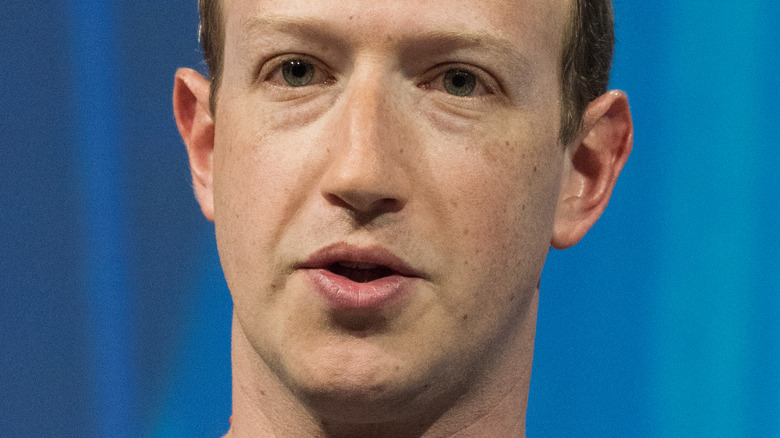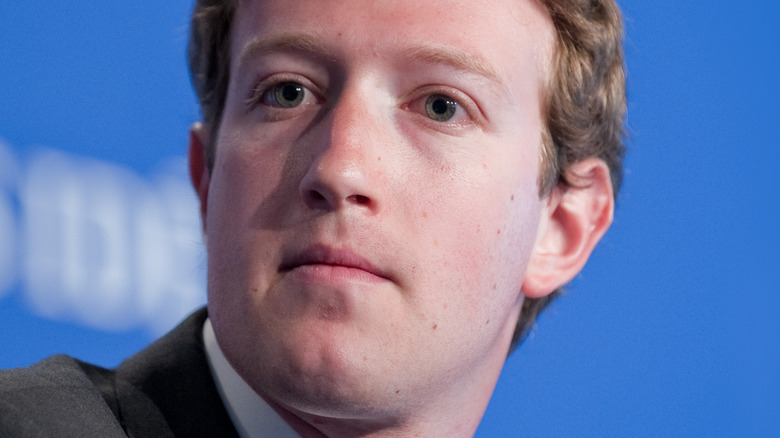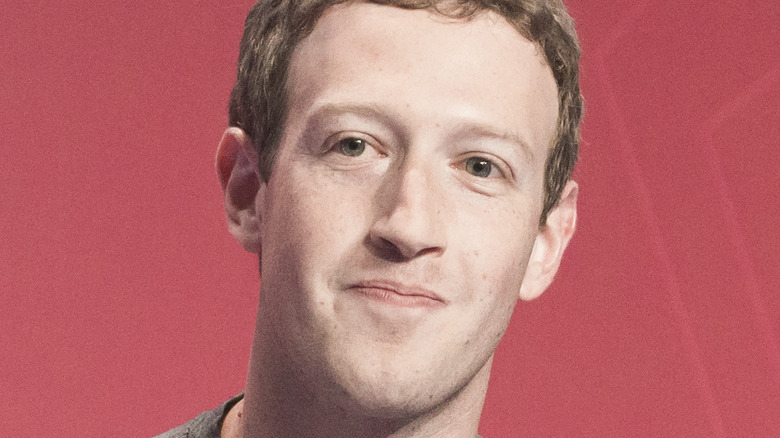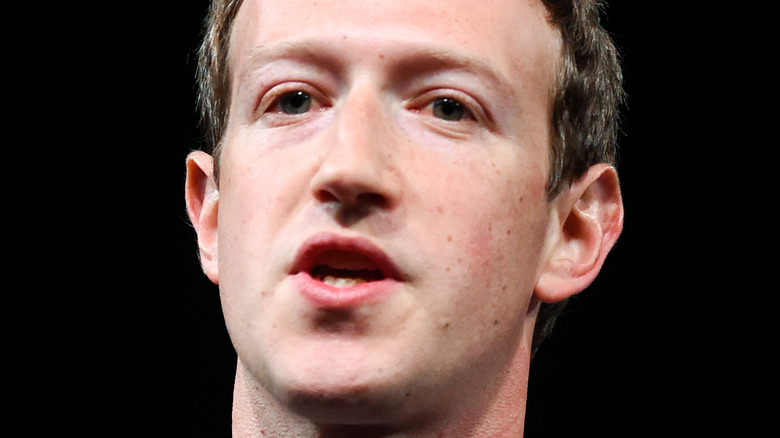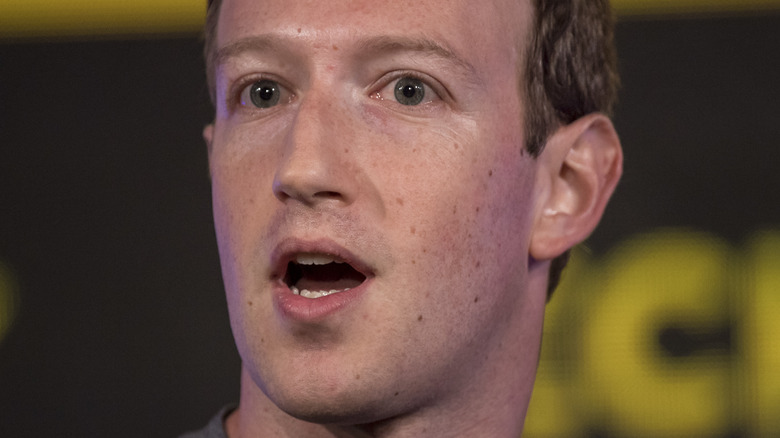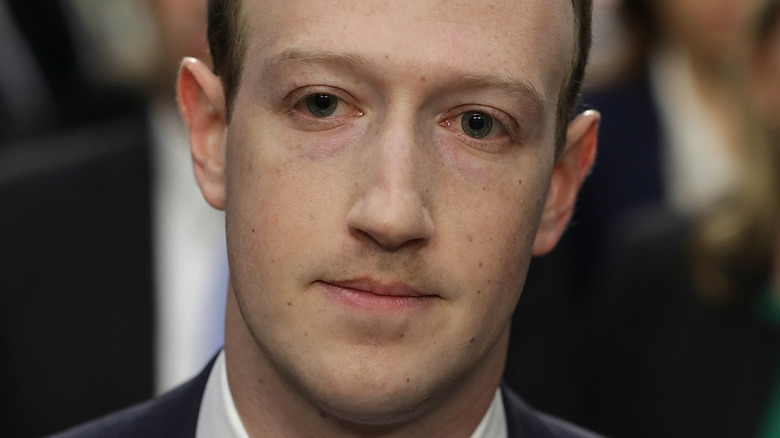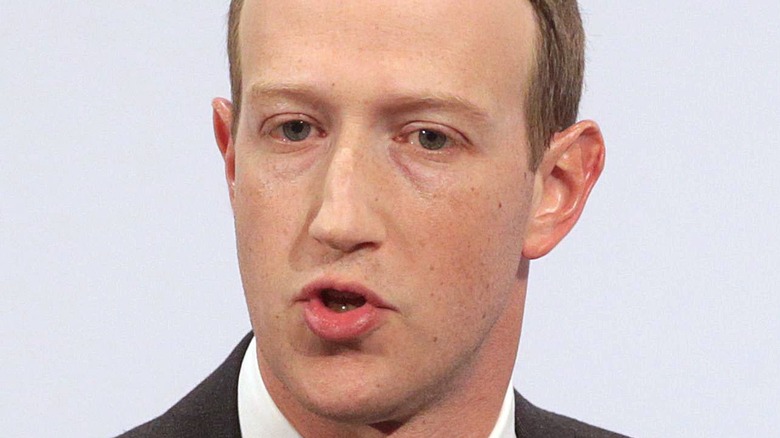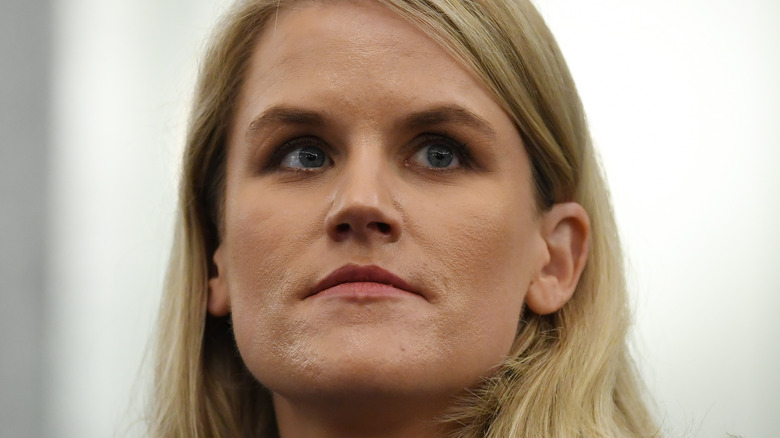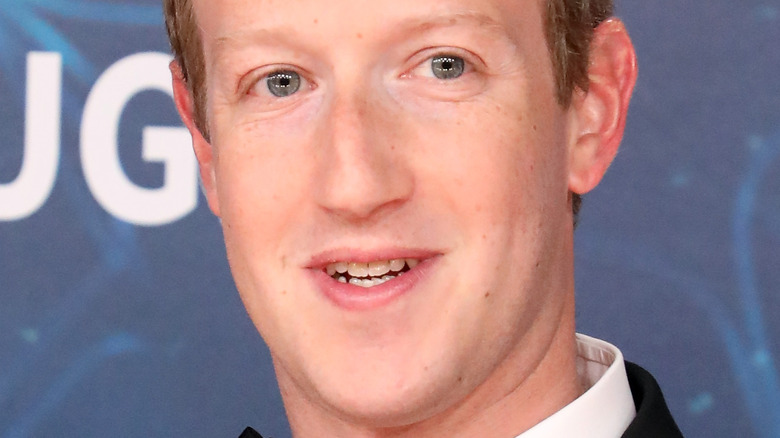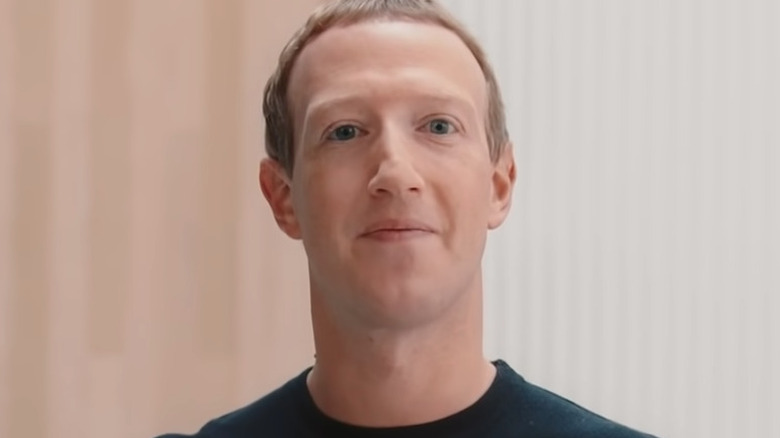Why We're Worried About Mark Zuckerberg
Facebook CEO and notable billionaire Mark Zuckerberg was once at the top of the world. In 2006, the Harvard dropout took his idea of a social networking platform for college students to the world and became a prominent leader in social media.
In 2010, he was named "Person of the Year" by Time. By 2012, he made Facebook public, with an IPO of $38 per share, which was the largest tech IPO in the history of the United States at the time. But the tech giant fell just as fast as he rose — and by all accounts, it appears that he is continuing to do so. Just ten years after his booming success with Facebook, Zuckerberg was grappling with his company as it fell behind competitor apps and continued to suffer from a damaged reputation.
From evidence of mishandling user data to Facebook's bad day at the stock market, here's how Zuckerberg fell from grace over the years and why we're worried about the Meta CEO.
Facebook suffered due to frequent data breaches
Facebook is no stranger to data and privacy issues. Over the years, the social media platform has had its fair share of data breaches, which affected millions of users and compromised personal information. Of the many leaks Facebook has accrued since its debut in 2004, the data breach of March 2019 was a significant one. According to Forbes, between 200 million and 600 million users of Facebook, Facebook Lite, and Instagram had their passwords exposed and subsequently stored in its internal storage system. The only issue? They were not encrypted, which left the passwords of millions of users vulnerable to being seen by Facebook employees.
Shortly after, Facebook engineer Pedro Canahuati issued a statement to address the breach, noting that the encryption issue had been fixed. In a company blog post, he wrote, "To be clear, these passwords were never visible to anyone outside of Facebook and we have found no evidence to date that anyone internally abused or improperly accessed them."
Two years later, the platform was under fire for another data breach, affecting approximately 530 million people. In April 2021, a hacker gained access to the personal information of Facebook users, including phone numbers, email addresses, and even locations, as reported by Insider. The social media giant had a different approach to this issue, however, and decided against alerting consumers to the compromised data. A spokesperson told NPR at the time, "We don't currently have plans to notify users individually."
User data was allegedly mined for profit
Facebook had an issue that far surpassed incidental data leaks. The company allegedly had an algorithmic system that intentionally exploited user data to generate profits. In an op-ed with Time, tech investor Roger McNamee revealed the specific ways Mark Zuckerberg and his company allegedly leveraged user interests and information for personal gain. "To feed its AI and algorithms, Facebook gathered data anywhere it could. Before long, Facebook was spying on everyone, including people who do not use Facebook. Unfortunately for users, Facebook failed to safeguard that data. Facebook sometimes traded the data to get better business deals," he said.
The company apparently had no plans of sharing user data with anyone that it couldn't profit from. According to a November 2019 report by Duncan Campbell obtained by Insider, the social media platform allegedly stopped rival networks like Twitter and Youtube from accessing user data in 2012 and even had plans to make developers and companies pay up to obtain user data between 2012 and 2014. However, the inner workings of Facebook and Zuckerberg's role in building up the platform at the expense of users and competing companies did not continue to go unnoticed.
Months before the Duncan Campbell report broke headlines, Facebook was issued to pay a $5 billion fine by the Federal Trade Commission (FTC) in July 2019 for its failure to secure and protect user data, per The New York Times.
The 2016 presidential election changed everything
By the time of the presidential election in 2016, the United States was growing increasingly polarized. As presidential nominee campaigns were ongoing at the time, internet outlets and social media platforms both played a large role in relaying information to the public, regardless of how truthful it was. A study conducted by Andrew Guess of Princeton, Brendan Nyhan of Dartmouth, and Jason Reifler of the University of Exeter came to some alarming conclusions. "Facebook played an important role in directing people to untrustworthy websites," the study stated. "Heavy Facebook users were differentially likely to consume information from these sites, which was often immediately preceded by a visit to Facebook."
Due to Facebook's algorithm, trending stories — including fake news pieces — circulated through the news feeds of millions of users and spread to many on both sides of the political spectrum, per The Atlantic. Because of this, misinformation spread at an alarming rate. An analysis by Buzzfeed suggested that during this critical moment in the election cycle, related stories from hard news outlets such as The New York Times or The Washington Post had received significantly less engagement than the same amount of stories from hoax websites and hyperpartisan blogs.
The strong presence of fake news stories, and Facebook's lack of action to filter false information, drew outrage from many. It also led to a public and arguably disastrous senate committee hearing in 2018, in which Mark Zuckerberg would have to account for Facebook's many mistakes.
... Then came the Cambridge Analytica Scandal
As presidential campaigning was in full force in 2015, politicians were taking different avenues to convey information to their target audiences and win over the approval of desired demographics. As reported by Insider, Donald Trump's campaign team was one such group that hired Cambridge Analytica to collect data from millions of users with which to deliver targeted ads.
On the surface, the process may seem innocent enough. However, in March 2018, former employee and whistleblower Christopher Wylie alleged that the firm collected the data of 87 million users through a quiz, "This is My Digital Life." Per Vox, this quiz not only exposed the data of the primary user but also the data of the user's Facebook friends. The social media platform had consistently pledged the importance of user safety and privacy and had apparently fallen short of it. However, as noted by the outlet, while Facebook had prohibited the sales of data harvested in this way the political data firm had cashed it in, regardless.
The Cambridge Analytica Scandal was majorly important because of its implications on both data privacy and the democratic process. Zuckerberg responded to the scandal, but he did not apologize for his shortcomings. In a lengthy Facebook post, he wrote, "I've been working to understand exactly what happened and how to make sure this doesn't happen again. The good news is that the most important actions to prevent this from happening again today we have already taken years ago."
Zuckerberg's senate hearing tainted his image
The Cambridge Analytica Scandal drew significant negative attention to the already weakened reputation of both Facebook and Mark Zuckerberg. In April 2018, the mogul was called to testify for the US Senate Judiciary Committee in response to the scandal. His testimony, which spanned 2 days and 600 questions from Congress, centered around privacy and data protection on Facebook as well as other issues such as misinformation and hate speech.
Zuckerberg faced intense questioning during the hearing, which put the spotlight on the Facebook CEO to take accountability for the company's many faults. He defended his position several times but acknowledged that as the head of the platform, he is responsible for each and every issue that occurs within it. When discussing the matter of how user data was exposed, Zuckerberg testified (via The Guardian), "It's clear now that we didn't do enough to prevent these tools from being used for harm. That goes for fake news, foreign interference in elections, and hate speech, as well as developers and data privacy."
Reactions to Zuckerberg's testimony varied — possibly because the hearing itself became disastrously humorous at points. Critics of how the hearing was handled noted the lack of technological literacy and understanding of many older Congress members, while others highlighted the Facebook CEO's avoidance of more pressing questions. Despite the intention of clearing up his position on certain tech-related matters and taking accountability for Facebook's many issues, Zuckerberg only attracted more criticism from the hearing.
TikTok became Facebook's biggest competitor
Despite initially launching in 2016, short-form video content platform TikTok grew increasingly popular during the COVID-19 pandemic, when many were reconfiguring their daily lives. According to data from Statista, user engagement on the platform increased from 2020 to 2021, with the average user spending 19.6 hours on the app each month in 2021, up from 13.3 hours per month in 2020. As TikTok's engagement increased, Facebook's steadily decreased.
The cause for the decline of Facebook, outside of the controversy surrounding its many scandals, is due to a shift in user demographics. At its peak in the late 2000s and early 2010s, Facebook relied on a specific audience to drive engagement on the platform: young people. Over the years, however, Facebook has struggled to maintain relevance in an ever-changing, fast-paced world. In a report on the trend, The Verge noted, "Facebook's struggle to attract users under the age of 30 has been ongoing for years, dating back to as early as 2012." According to Hootsuite, in 2022, the app is mostly used by people in the 35-44 age range, which is far from the young audience it needs to thrive.
As of 2022, TikTok is the most downloaded app worldwide, totaling 3.5 billion downloads. According to Bloomberg, Zuckerberg acknowledged TikTok as being a key rival during a company-wide meeting and expressed his desire for Facebook and Instagram to focus on video, moving forward. Whether it will help the company reclaim engagement is another matter.
A whistleblower revealed Facebook's secrets
The Cambridge Analytica whistleblower was not the only person to disrupt the workings of Facebook. As reported by NPR, two years later a former data scientist on the social media platform, Frances Haugen, alleged that the platform knowingly spread misinformation, encouraged hate speech, and did the bare minimum to regulate posts in order to generate an inordinate amount of profit. In an interview with "60 Minutes," the former Facebook data scientist said, "Facebook has realized that if they change the algorithm to be safer, people will spend less time on the site, they'll click on less ads, they'll make less money."
When Haugen came forward with her allegations, she submitted thousands of documents from Facebook's internal system to both Congress and the Securities and Exchange Commission (SEC) to allege the deeply ingrained problems on the platform and within company management, according to Time. That year, she testified in a Senate Commerce Subcommittee on Consumer Protection (via AP News) and made further accusations regarding Mark Zuckerberg and Facebook's potentially unethical methods for generating ad revenue.
Alleging that the platform targets vulnerable users with negative content, Haugen said, "They know that algorithmic-based rankings, or engagement-based rankings, keeps you on their sites longer. You have longer sessions, you show up more often, and that makes them more money." On Facebook, the Meta CEO denied the accusations, and wrote of his staff, "Most of us just don't recognize the false picture of the company that is being painted."
A record-breaking stock drop that cost billions
Negative opinions of the social media platform were already strong due to Facebook's many data breaches and alleged involvement in a political scandal with the Cambridge Analytica leak. However, Frances Haugen's accusations added a further blow to the company's crumbling reputation. Per The Oregonian, following the whistleblower's testimony, Facebook's stock fell 26% to $237.36 per share, costing the company and its investors $230 billion. The unprecedented drop was the biggest recorded single-day stock slump for a company ever.
The stock plummet also came months after Mark Zuckerberg announced that the company would be rebranding to Meta, as a company that seeks to encompass a vision to move toward a virtual world of social connection. As for what Meta and the Metaverse will entail, ABC News explained, "Theoretically, the metaverse would be a place where people can meet, work and play using virtual reality headsets, augmented reality glasses, smartphone apps or other devices." However, Zuckerberg's attempt at rebranding Facebook to bring back user engagement and re-establish itself as a leader in social media didn't exactly work in his favor.
Mark Zuckerberg's rebranding didn't work
Mark Zuckerberg announced that Facebook would be rebranding and changing its name to Meta in October 2021 — the same month that Frances Haugen raised allegations against the company. As part of the rebranding, the CEO shared his plans to expand Meta into a whole universe of its own, called the metaverse. Based around virtual reality, Zuckerberg claimed that it will be the next leading internet force. During Facebook's yearly AR/VR conference, he insisted, "We believe the metaverse will be the successor of the mobile internet. We'll be able to feel present — like we're right there with people no matter how far apart we actually are," (via The Guardian).
The exact functions of the metaverse have yet to be worked out, but many are already weary of its success. The Harvard Business Review claimed that the rebranding will drive users away from the platform, writing, "The company sets itself up to confuse people at best; at worst, it will disappoint people and further degrade their trust in the company."
Furthermore, per Insider, a study by The Harris Poll found that the company's name switch and rebranding actually harmed its reputation, with its trust score falling 6.2% after Zuckerberg's unexpected announcement. The move toward the fully-envisioned metaverse is over a decade away according to Zuckerberg. But that's assuming that Facebook and the other sites encompassed by Meta won't crumble by then.

